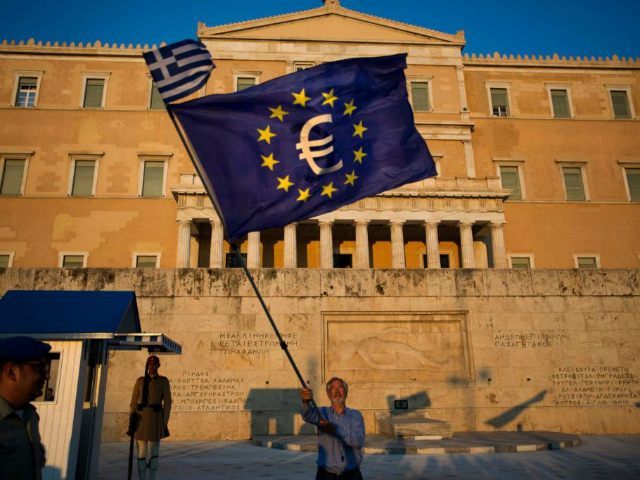A leaked IMF study of the Greek debt crisis, ignored by creditors at the weekend, warns Greece may need a 30 year moratorium to pay off European debt, including new loans, and a dramatic extension on the maturity of its debts. The study doubles as a warning that the IMF won’t participate in a Eurozone rescue package unless others agree to Syriza’s requests for sweeping debt relief.
The Telegraph reports this vastly complicates last weekend’s rescue deal “since Germany insists that the bail-out cannot go ahead unless the IMF is involved.” In addition Greek MPs being asked today to vote for painful economic reforms will now be aware the IMF itself agrees with Prime Minister Tsipras that the package cannot restore the nation’s economic fortunes.
The IMF report states that Greece’s public debt is expected to peak at close to 200 per cent of GDP over the next two years. It describes this as “highly unsustainable” a situation that “can now only be made sustainable through debt relief measures that go far beyond what Europe has been willing to consider so far.”
Blame for instability is laid on “the events of the past two weeks—the closure of banks and imposition of capital controls” which are said to be “extracting a heavy toll on the banking system and the economy, leading to a further significant deterioration in debt sustainability.”
The instability of the last two weeks brought about a radical reassessment of the IMF’s Debt Sustainability Analysis (DSA). The amended DSA says the total financing need until the end of 2018 is now €85 billion (€25 billion higher than just two weeks ago). It concludes:
“The dramatic deterioration in debt sustainability points to the need for debt relief on a scale that would need to go well beyond what has been under consideration to date.”
A senior IMF official told the BBC the fund will only participate in a third Greek bailout if EU creditors produce “a clear plan,” declaring that the current deal to address the Greek debt crisis “is by no means a comprehensive, detailed agreement.”
While a bailout deal is finalised, the European Commission has today formally proposed offering short-term finance of €7bn provided through the European Financial Stability Mechanism (EFSM) “to safeguard financial stability” in the EU and Eurozone. Despite Britain not being a member of the Eurozone, use of the EFSM would put it on the hook for relief funds as it is funded by all 28 EU member states.
Chancellor George Osborne yesterday declared the EFSM idea a “non-starter”, arguing that Eurozone countries alone should be called on to alleviate the Greek debt crisis. The Czech Republic agrees.
The problem for them is that unanimity among 28 member states is not required to trigger the process, it can be initiated by qualified majority voting. This means Britain and the Czech Republic, as well as others, could be forced to contribute if just 15 countries representing 65 per cent of the EU’s population vote in favour.
Meanwhile Greece continues to groan. Banks that have been shut since 29 June remain closed and may stay so for a further month whilst a bailout is ratified. Trade unions and other associations representing civil servants, municipal workers and pharmacy owners have called for strikes to coincide with today’s parliamentary votes.

COMMENTS
Please let us know if you're having issues with commenting.